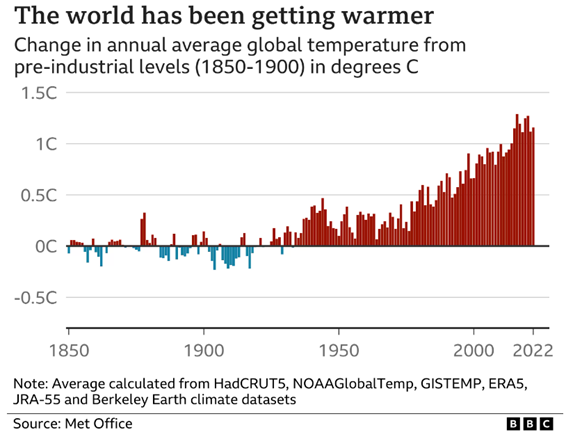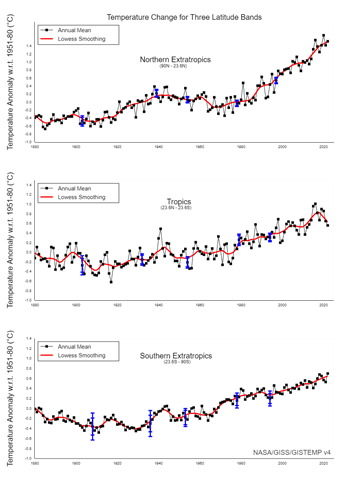2023 confirmed as world's hottest year on record:
https://www.bbc.com/news/science-environment-67861954
‘The Hottest Year on Record’, how was this determined, how can it be validated? Many media sources seem to think that this magical figure, Annual Average Global Temperature, exists. Another example from the BBC:

https://www.bbc.com/news/science-environment-24021772
The figures here are calculated from the average of 6 data sets from different sources, most of which have only come into existence recently. Where do the older figures come from? How is it determined that the measurements are consistent?
The various Met offices around the world have been collecting measurements for many years, however the measurement techniques and the locations of the measuring stations have changed over time. Historically the measurements were taken manually at various intervals ranging from daily to every half hour. Today they are recorded automatically so peaks that may have been missed by manual recording will appear in the trends. Locations also change over time. There are strict requirements for ‘Class 1’ weather stations, specifying distances from any features likely to compromise the readings. Many measuring stations are located at aerodromes/airports which have been significantly developed, for example grass runways replaced with tarmac which will increase the local temperature.
How the averages are weighted is also important. Looking at temperature change graphs from different latitudes shows the problem. The BBC graphic above is very close to the northern latitudes curve but the temperature change in the southern latitudes is about half that of the north and is similar to the tropics. An average of all three curves would show a significantly smaller change than the BBC one. Which it true?

https://data.giss.nasa.gov/gistemp/graphs_v4/
Even the Climate Activist Grantham Institute accepts that there is a problem:
‘Statements such as “2014 earth’s warmest year on record” or “No global warming for 18 years 1 month” are conclusions from different atmospheric temperature data sets. Before assessing which is true it is important to understand how temperatures are measured, how data sets are created and used to calculate global temperatures, and the strengths and weaknesses of each approach.’
If the Annual Average Global Temperature is not consistent any calculations showing the effect of rising CO2 levels must also be inconsistent. Are the CO2 levels in the southern hemisphere less than in the north?
Why don’t we see this temperature rise in the US data, also from NASA GISS?
Can anyone point me to a definitive source for the ‘Global Average Temperature’ that is currently driving the ‘Climate Emergency’?
The rate of rise of temperature is critical for the setting of policies. Do we have a climate emergency or just a climate problem?
If the rate of rise is over estimated huge amounts of the earths finite resources will be wasted producing low energy density intermittent power sources and scrapping existing, not life expired power sources.
If the rate of rise is more reasonable we have time to run the existing fossil fuel powered systems to the end of their lives, replace them with modern nuclear power plants and upgrade the energy distribution system. There is also time to upgrade/replace the housing stock to reduce energy losses there.
What would be a sensible approach if the rate of temperature rise is half of the figure the headlines are giving us? How can we get a reliable figure?
An interesting piece on climate scare mongering from Hannah Ritchie: